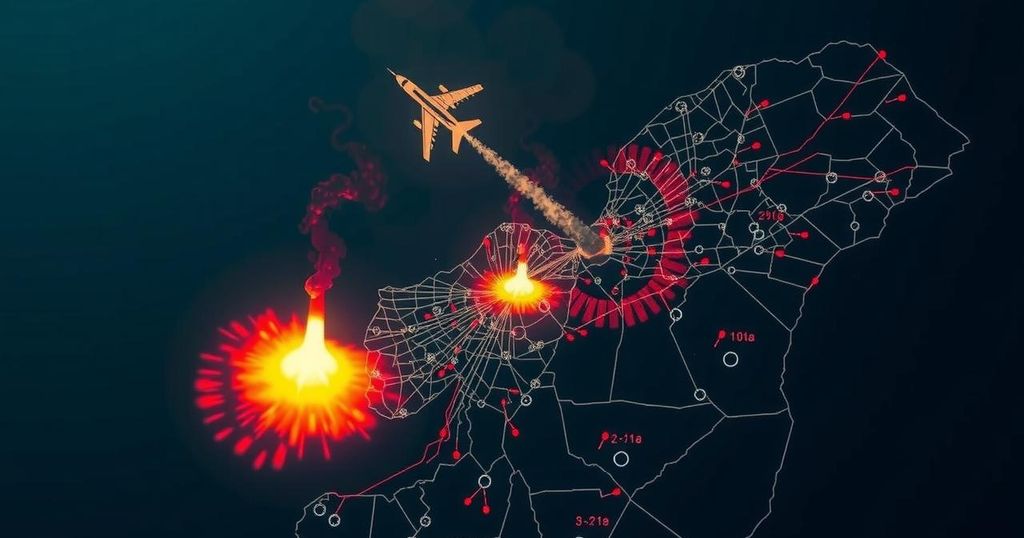Israeli Airstrikes Target Hezbollah’s Financial Operations Amid Escalating Conflict
Israel has conducted airstrikes across Lebanon targeting Hezbollah’s financial operations, specifically targeting the Al-Qard Al-Hasan firm. In a concurrent escalation of violence, Hezbollah retaliated with missile strikes on Israel. Meanwhile, ongoing negotiations seek to establish a ceasefire in Gaza amidst rising casualties on both sides.
Israel has initiated a series of airstrikes across Lebanon, including in its capital, Beirut, with the objective of dismantling the financial operations of the Iran-backed militant organization, Hezbollah. Reports indicate that no immediate casualties were confirmed from the airstrikes, which produced multiple explosions late on Sunday. The strikes specifically targeted locations associated with Al-Qard Al-Hasan, a financial entity that has been under U.S. sanctions since 2007 for facilitating Hezbollah’s financial transactions. U.S. Treasury officials have accused the organization of undermining Lebanon’s economy by draining vital financial resources while falsely claiming to support the Lebanese populace amid ongoing economic challenges in the country. The situation escalated further as Israeli forces engaged in heavy exchanges of fire with militants along the Lebanese border. Hezbollah reportedly launched missile attacks on both military targets and the Israeli city of Safed, while the Israel Defense Forces (IDF) retaliated by striking military and intelligence facilities. Amid these tensions, it was reported that rescuers faced difficulties reaching individuals injured in an airstrike in northern Gaza on Saturday, which resulted in the deaths of at least 73 people, as persistent bombardments hampered rescue operations. In light of the ongoing violence, Ronen Bar, head of Israel’s internal security agency Shin Bet, traveled to Egypt for discussions concerning a potential ceasefire in Gaza and the release of hostages. The human cost of the conflict has been significant, with over 42,603 fatalities reported in Gaza and 2,448 deaths recorded in Lebanon, as documented by respective health ministries. While the situation remains dire, the geopolitical implications are also notable as Iran continues to face challenges due to Israel’s strikes against its allies in the region, raising concerns regarding potential escalations.
The recent escalation of hostilities between Israel, Hezbollah, and other militant groups in the region is rooted in longstanding political, economic, and territorial disputes. Hezbollah, supported by Iran, has played a significant role in the regional conflict, leading to consistent military responses from Israel, particularly as tensions heighten following specific provocations or significant attacks. The economic collapse in Lebanon, exacerbated by the Syrian conflict and ongoing sanctions against Hezbollah, has compounded the humanitarian crisis, leading to an urgent need for financial interventions that are complicated by sanctions imposed on groups alleged to support terrorism. The international and regional ramifications of this conflict continue to be profound, as they challenge existing power dynamics and influence relationships among regional actors and global powers.
In conclusion, the recent Israeli airstrikes targeting Hezbollah in Lebanon represent a significant escalation in the ongoing conflict between Israel and Iranian-backed militias. The implications of this conflict extend beyond immediate military objectives, profoundly affecting the economic and humanitarian framework within Lebanon and the larger geopolitical landscape of the Middle East. Efforts for ceasefire negotiations highlight the urgent need to address the underlying issues fueling these hostilities, as both military engagement and economic repercussions affect civilian populations on both sides of the border.
Original Source: www.washingtonpost.com




Post Comment